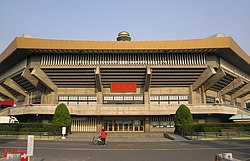This is an old revision of this page, as edited by Kintetsubuffalo (talk | contribs) at 04:20, 9 October 2010 (Undid revision 389224956 by Shyguy1991 if that's your idea of "notable", it's sketchy). The present address (URL) is a permanent link to this revision, which may differ significantly from the current revision.
Revision as of 04:20, 9 October 2010 by Kintetsubuffalo (talk | contribs) (Undid revision 389224956 by Shyguy1991 if that's your idea of "notable", it's sketchy)(diff) ← Previous revision | Latest revision (diff) | Newer revision → (diff) For the computer game Budokan, see Budokan: The Martial Spirit For the style of Karate, see Budokan Karate-do| Budokan | |
 | |
| Location | 2-3 Kitanomarukōen, Chiyoda, Tokyo 102-8321, Japan |
|---|---|
| Coordinates | 35°41′36″N 139°45′00″E / 35.69333°N 139.75000°E / 35.69333; 139.75000 |
| Owner | The Nippon Budokan Foundation (財団法人 日本武道館, Zaidan Hōjin Nippon Budōkan) |
| Capacity | 14,201 |
| Field size | Height: 42 m (140 ft) |
| Construction | |
| Built | 1964 |
| Opened | October 3, 1964 |
| Construction cost | 2 billion Japanese yen (5.6 million USD in 1964) |
| Architect | Mamoru Yamada |
| Main contractors | Takenaka Corporation |
The Nippon Budokan (日本武道館, Nippon Budōkan), often shortened to just Budokan, is an arena in central Tokyo, Japan.
For many Westerners, the Budokan is synonymous with large-scale rock concerts. It was here that The Beatles made their Japanese debut and the location where many "Live at the Budokan" albums were recorded. The Nippon Budokan, however, was originally built for the judo competition in the 1964 Summer Olympics, hence its name, rendered in English as Martial Arts Hall.
Location
The Nippon Budokan is located in Kitanomaru Park in the center of Tokyo, two minutes' walking distance from Kudanshita Subway Station, and near Yasukuni Shrine. This 42 m (140 ft) high imposing octagonal structure holds 14,201 people (arena seats: 2,762, 1st floor seats: 3,199, 2nd floor seats: 7,760, standee: 480) and is modeled after Yumedono (Hall of Dreams) in Hōryū-ji in Nara.
Venue history
Martial arts

Though it still functions as a venue for big musical events, its primary purpose is for Japanese martial arts. The national championships of the different branches of the martial arts (judo, kendo, karate, aikido, shorinji kempo, kyūdō, naginata, etc.) are held annually at the Budokan. For wrestling fans the Budokan means professional wrestling's big shows. Now, the Budokan is mostly used by Pro Wrestling Noah, who often hold major events there.
Music

The Beatles were the first rock group to perform here, in a series of shows in June/July 1966; their appearances were met with opposition from those who felt the appearance of a western pop group would defile the martial arts arena.
However, the Budokan gained worldwide fame when American artists Cheap Trick & Bob Dylan used the arena to record their concert albums, At Budokan (1978) and Bob Dylan at Budokan (1979), respectively.
Other artists to appear at this venue include Frank Sinatra (in 1974 and 1985), Queen, Deep Purple (for the last of the three concerts making up their Made in Japan live album; during their 1985 reunion tour the band played four consecutive nights here), Walker Brothers, Marvin Gaye (who performed there during his first and only Japanese tour in 1979) Led Zeppelin, Pink Floyd, David Bowie, Tin Machine (who recorded a portion of Tin Machine Live: Oy Vey, Baby), ABBA, The Police, Sting, Prince & The New Power Generation, Page & Plant, Van Halen, Def Leppard, Depeche Mode, Journey, Aerosmith, Peter Gabriel, Cyndi Lauper, Bryan Adams, Rush, Mötley Crüe, Genesis, Phil Collins, Styx, REO Speedwagon, Skid Row, KISS, Iron Maiden, AC/DC, Metallica, Judas Priest, Michael Schenker Group (One Night at Budokan, 1982), Yngwie Malmsteen, Red Hot Chili Peppers, Tina Turner, Whitney Houston, Janet Jackson, Celine Dion, Backstreet Boys, Mariah Carey, George Michael, The Rolling Stones, Fleetwood Mac, Blur, Linda Ronstadt, Christina Aguilera, Destiny's Child, Oasis (Three Nights in a Judo Arena, 1998), Donna Summer, Toto, Pearl Jam, Guns N' Roses, Eric Clapton, (his double album Just One Night was recorded there in 1980), John Hiatt, Ozzy Osbourne (who filmed "Live at the Budokan"), The Smashing Pumpkins, Muse & Dream Theater (who recorded a live 2DVD/3CD Live at Budokan).
Chatmonchy currently holds the record for the largest crowd at Budokan. Polysics holds the record for the most songs played during a concert, which is 42 songs.
Famous Japanese acts that have played at Budokan include Southern All Stars, Alice Nine, Eikichi Yazawa, Fumiya Fujii, Seiko Matsuda, ZONE, AAA, Porno Graffitti, Puffy AmiYumi, Pink Lady, The Back Horn, The Birthday, Elephant Kashimashi, B'z, BUCK-TICK, Miyavi, L'Arc~en~Ciel, Dir en grey, Nightmare, Mucc, Cornelius, Love Psychedelico, Every Little Thing, Glay, The Gazette, Asian Kung-Fu Generation, Hikaru Utada, Hyde, Yellow Magic Orchestra, Misia, Morning Musume, M-Flo, Do As Infinity, X Japan, LUNA SEA, Ringo Shiina, Tokyo Jihen, Nana Mizuki, Janne Da Arc, VAMPS, SID, Siam Shade, Princess Princess, Yui, Mai Kuraki, Malice Mizer, FLOW, Home Made Kazoku, Perfume, SPEED, Tohoshinki, Uverworld, mihimaru GT, Angela Aki, Plastic Tree, An Cafe, Ayaka, Base Ball Bear, May'n, POLYSICS, Megumi Nakajima and Maaya Sakamoto.

Other events
A national ceremony to mourn the Second World War dead is held with the attendance of the Prime Minister, the Emperor and the Empress annually in Budokan on August 15, the day of Japan's surrender.
References
- Antimusic.com - Cheap Trick - Budokan!
- "Japan keeps Lennon's memory alive". BBC News. December 8, 2008. Retrieved April 7, 2010.
- 1964 Summer Olympics official report. Volume 1. Part 1. pp. 128–30.
External links
| Preceded byImperial Garden Theater | Host of the Japan Record Awards 1985-1993 |
Succeeded byTBS Broadcast Center |